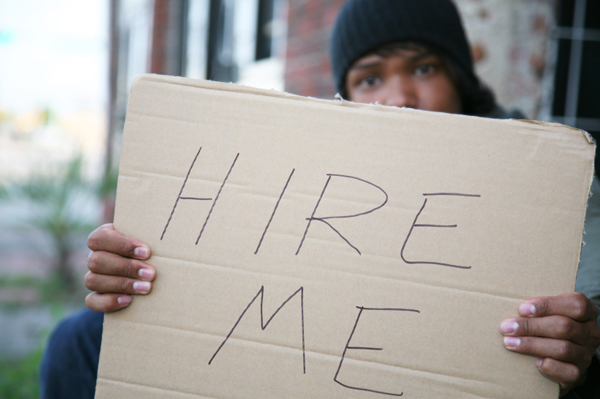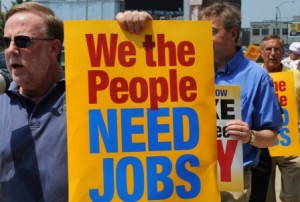
For the past couple weeks I’ve been sharing a series of stories from unemployed Rhode Islanders engaged in the Where’s the Work? initiative, an Ocean State Action Fund project that’s trying to highlight the human side of the Great Recession, which often–crazily enough–gets ignored or marginalized.
In this installment, Esther C. was kind enough to describe her experiences with joblessness and give an incisive perspective on the ways the unemployment crisis is hurting all Rhode Island workers, jobless and employed alike.
Esther grew up in Central Falls. Her parents labored in factories, and Esther began working at a young age. For the last 30 years Esther has been a medical assistant, and has a great deal of experience working in both private practices and public clinics in a number of states. Several years ago she returned to Rhode Island, moving back to her hometown to help care for her elderly parents when they took sick. But a year and a half ago Esther was laid off from her medical assistant position, and though she’s been trying to find another job ever since, securing employment has been very hard.
“For every job,” Esther explains, “there’s ten or twenty people applying. So what do you?” She bites her lip. “You get frustrated. Nothing comes through.
Esther has been doing her best to survive on unemployment insurance. “You cut back and you cut back and you cut back, but there’s only so much you can cut. You have to be so careful about budgeting—you budget rent, gas, electricity. My phone is disconnected. Disconnecting the cable isn’t so bad; I mean, if you’re out all day looking for a job, you’re not watching TV. But losing my phone and internet is tougher.”
Esther works hard to save money. “I live off the dollar store. I’m all over the place. I go from store to store to find the very, very cheapest necessities, just to make ends meet. I have to give credit to my parents—they showed us how to survive on a minimum.”
“My problem,” she continues, “is I have a lot of experience. And nobody wants to give you what you should be earning. With my experience in the medical field, I should be earning at least $16-18 an hour. But there’s so many people out there trying to get jobs, employers aren’t willing to give you what you should be earning. They can get someone younger, with less skills and experience for $10, $8 an hour.” Esther sighs. “I’m not a dumb person. I know what I should be making with my qualifications. When you go into an interview, even if you should be earning much more, you have to ask, ‘Can you give me at least $12?’ But even then that’s asking for too much, because they want you to work for nothing, and no health insurance, no benefits. It’s very stressful. You have to accept that you’ll have to take a job for $10, even though you know you’re worth more.”
Not only are wages being decreased, Esther explains, but employees are being asked to work harder for that lower pay. “For example,” she says, “I’m bilingual. People want you to be an interpreter for the office, running around half the day translating for everyone while doing the same amount of medical work. But are they willing to pay you for that, for doing two jobs in one? They’re not. But you have to take it cause there’s nothing else, you have to take what they dish to you.”
And that’s not all—in Esther’s experience, basic employee rights are also falling by the wayside. “Once you get a job nowadays, you have to do whatever they tell you. You have to keep your mouth shut, you have to be a humble mouse.” She shakes her head indignantly. “I don’t want to bring up slavery, but really, sometimes that’s what the system feels like. You work harder, and you’re making less, and you’ve got no dignity anymore. There are some places where you can’t even smile or laugh, you have to be so rigid in their control system. You can’t take time off for a sick child or a sick parent. You can’t speak your mind, you can’t imply in any way that you deserve to be treated better than you’re being treated. They’ll just throw you right out. Cause we’re a dime a dozen in this recession. When you’re a dime a dozen, there’s nothing you can do, cause they can hire someone for less.”
Esther does have plans for the future, but they’re complicated. “I’m trying to go back to school,” she says. “The problem is that classes are expensive, even online. You’re at this age—I’m gonna be 50 years old—and you ask, should I go back to school and get in debt for $80,000? You have to get yourself in debt to get yourself a job.”
After a moment, she continues. “I guess it’s like they say, the rich get richer and the poor get poorer. There’s no more middle class, there’s either rich or poor. And I don’t think there’s a way to get from one to the other.”
“Still, I’m optimistic,” Esther says. “It’s tough. But I’m a strong person. I’m going to come out one way or another. Whether they like it or not, I’m gonna come out of this.”




